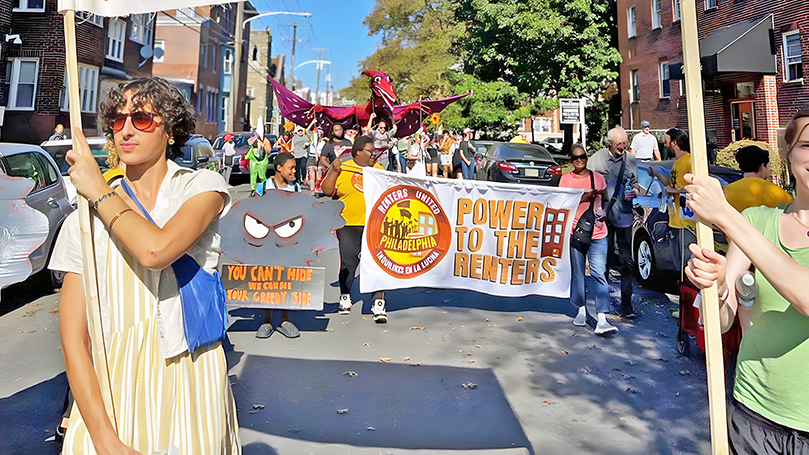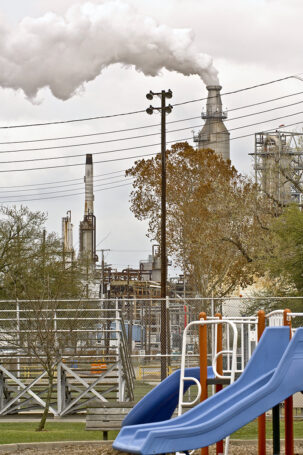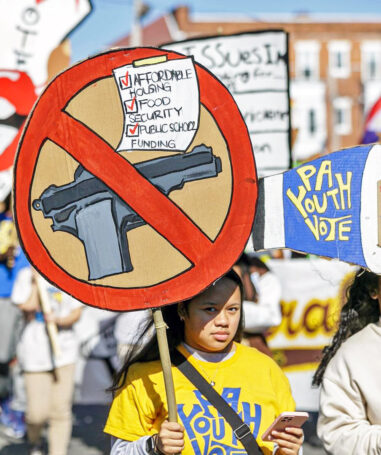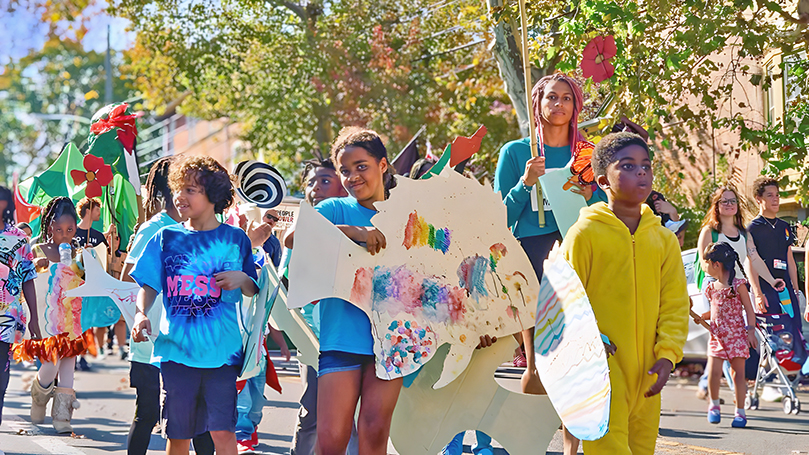
As a political organization committed to fighting for working-class interests in Philadelphia, we feel that it is our responsibility to provide our analysis of the new mayoral administration’s priorities. Mayor Cherelle Parker released a first 100 day action plan for Philadelphia, to set the tone for the next four years. This document may provide insight into the trajectory of our struggle during this administration. The following document is the product of collective reflection and critique on the part of the Philadelphia Young Communist League. It follows the structure of the Mayor’s 100 day plan, concluding with our final thoughts.
Public safety
Public safety is a serious concern for many people in our city. We have seen an increase in gun violence since 2020 injure or take the lives of over 8,500 community members. The people of Philadelphia deserve to have this issue seriously considered and addressed to prevent further injuries or loss of life. Unfortunately, instead of acknowledging the underlying systemic issues causing this violence (eg. poverty, a lack of economic opportunity, and no support for communities), Mayor Parker seeks to obscure them, saying instead that the real underlying cause of this violence is a lack of policing — a gross statement, considering that law enforcement is a common source of violence, as the killings of Eddie Irizarry and Alexander Spencer and the assault of Angel Davis tragically illustrate.
This administration not only puts forth that the solution is policing, but also that the communities experiencing gun violence are to blame. Using phrases like “community policing” insinuates that the communities need to police themselves and distorts the popular call for community control of the police. ATV use is called out specifically in this document, under so-called “quality-of-life crimes.” This term “quality-of-life crimes” is troubling to hear. It can be used to hide the criminalization of community or cultural practices and to escalate minor crimes such as shoplifting. Once again, the mayor distorts a popular phrase in “quality of life,” diverting attention away from the real issues impacting the quality of life of Philadelphia residents.
Mayor Parker also inserts issues of public health into the public safety section — substance abuse, unhoused individuals, and mental health — in order to put forth solutions based on policing. This is a rhetorical ploy utilized to suggest a softer edge to policing, nesting it among important issues and invoking thoughts of helping vulnerable community members, in order to pave the way for an expansion of the police force. Rather than uplifting public health and housing, Parker’s insertion of these issues into the public safety section is yet another example of how police are centered above all else.
There is no dedicated section to public health in this document. In the mayor’s eyes, the police are the only worthwhile investment when it comes to solving issues regarding the wellbeing of our city. We reject this and insist that what this city needs are solutions that exist outside of the carceral system, including for gun violence. There are a large number of academic and government institutions that advocate for a public health, not law enforcement, approach to reducing violence, and treating it as an epidemic. Instead of heeding these calls and declaring a public health emergency, Mayor Parker opts for the much more vague “Public Safety Emergency,” aiming to please those caught up in media portrayals of Philadelphia as a dangerous and unpleasant place to live.
“Clean and Green”
In her “Clean and Green” initiative, the Mayor refuses to take responsibility as a governmental representative for the health and wellbeing of Philadelphians. Instead, the administration focuses on individual level behaviors, blaming residents of the city for environmental injustices that have plagued Philadelphia for decades. The Administration describes the current state of the city as primarily impacted by “quality-of-life” concerns and names blight, graffiti, informal trash disposal, abandoned cars, potholes, and tractor trailers as some of the biggest environmental issues Philadelphians face.
In doing so, the Parker Administration places the blame solely on the shoulders of working-class Philadelphians, while stripping these conditions of all socioeconomic and historical context. Does Philadelphia suffer from so-called blight? Or have the city’s BIPOC neighborhoods been routinely underfunded, underserved, and overpoliced, producing disinvestment and segregation? Is graffiti the biggest threat to the environmental health of the city — or is it the pollution emitted from industrial plants that poison us? If littering and illegal trash dumping are as significant a threat to the city as this plan claims, shouldn’t the administration be asking why residents are unable to utilize sanitation services?
 Although lip service is paid to environmental justice, conveniently, there is no mention of environmental racism, or the climate crisis, which continues to devastate the city. That environmental injustice most significantly impacts the health of Philadelphia’s Black working-class communities is no accident. It results from the intentional and systemic disinvestment that produced the conditions the Mayor now deplores as the fault of Philadelphians. By blaming Philadelphians for environmental injustice, and cracking down on individual actions rather than corporate pollution, Mayor Parker turns to a carceral philosophy, yet again, to solve an issue created by corporate and political leaders.
Although lip service is paid to environmental justice, conveniently, there is no mention of environmental racism, or the climate crisis, which continues to devastate the city. That environmental injustice most significantly impacts the health of Philadelphia’s Black working-class communities is no accident. It results from the intentional and systemic disinvestment that produced the conditions the Mayor now deplores as the fault of Philadelphians. By blaming Philadelphians for environmental injustice, and cracking down on individual actions rather than corporate pollution, Mayor Parker turns to a carceral philosophy, yet again, to solve an issue created by corporate and political leaders.
Citizens of Philadelphia are not sick because of graffiti. The mayor speaks of a cleaner and greener city — but for whom? In the first 100 days, the administration aims to announce a plan to address these aforementioned “quality of life” concerns; to expand the PHL Taking Care of Business Initiative; and to form a “Clean and Green Cabinet” to coordinate a city-wide response to reduce littering, dumping, and waste generation, while increasing the rate of recycling in the city. Of these three action items, none address the structural factors that led to the city struggling with pollution and trash, nor is there any mention of the populations most impacted by environmental injustice. What good does PHL TCB do for working-class Philadelphians without meaningful access to green spaces, or for any residents outside a business corridor, for that matter? How will recycling campaigns reduce the number of Philadelphians suffering from environmental-related illnesses? Five years ago, the American Lung Association declared the air of Philadelphia a health risk. Shouldn’t an administration that has professed its love for a clean and green city be more focused on addressing air quality than sheltering corporate interests?
Housing
Philadelphia is in a housing crisis. With record inflation, and corresponding record corporate profits, we are at a point where just under half of Philadelphia renters pay 30% or more of their income on rent. Economists predict that the price of housing will not return to pre-pandemic levels anytime soon, if ever. Despite the urgency of the situation, Mayor Parker notably does not entertain the idea that housing prices should or even could come down. Instead, Parker offers little more than administrative shuffling and vague “assistance” from the city government.
This indifference toward the housing crisis is sadly unsurprising coming from a representative of capitalists like Cherelle Parker. The idea of taking government action to lower the price of housing is simply unthinkable. At best, the government can scrounge up a few million dollars for incredibly limited social programs like “Philly First Home” and “Turn the Key.” Both of these are cited in her 100 days initiative as successful programs, but only assist an incredibly limited number of Philadelphians who are looking to buy their first home, with minimal grants to a few families. And those who apply must jump through an absurd nine-step bureaucratic process that includes filling out an interest form, an application, which consists of two separate documents, attending a “homeowner counseling program,” and two separate one-on-one interviews before getting approved. These programs stand in stark contrast to our nationally acclaimed Eviction Prevention Project, which despite being a very successful policy goes unnamed in her initiative. For all Mayor Parker’s bluster about reducing red tape inefficiency for business, her lack of attention to reducing the bureaucracy homeowners, renters, and our houseless neighbors have to wade through to receive aid is incredibly revealing of her administration’s priorities.
 For the 46% of Philadelphians who are renters, the only suggestion put forth from Parker is a bailout for their landlords! This is a laughable proposal, given that just a few years ago many of those same landlords outright refused to accept payments from the federally instituted COVID-era Emergency Rental Assistance program.
For the 46% of Philadelphians who are renters, the only suggestion put forth from Parker is a bailout for their landlords! This is a laughable proposal, given that just a few years ago many of those same landlords outright refused to accept payments from the federally instituted COVID-era Emergency Rental Assistance program.
Despite Mayor Parker’s affinity for the idea of the small, “mom and pop” landlord, a small landlord is still pressured to charge market rates by corporate-dominated market forces. Concrete ideas with a proven track record of lowering the market price of housing — like rent control, building cheap and desirable public housing, or taxing properties that landlords keep vacant — go unmentioned. Mentioning these alternatives would address the root problem of our wide-spread housing instability, which stems from giving the “free market” free reign to govern how we provide housing for our city. As a result, the oft-proposed solution to simply build more housing has just as much potential to deepen our crisis as it does to ameliorate it.
Economic opportunity
In her plan, Mayor Parker alludes to the goal of increasing city jobs for people with no college degrees. While this does gesture toward creating more opportunities for a bigger section of the working class, it is clear from her statement that Mayor Parker prioritizes the desires of business owners rather than the workers that create their profit and value. For example, her language that characterizes the “current state” of affairs is correct in assessing that a lack of middle-wage jobs is a problem. However, her focus on solutions seems entirely oriented around helping the rich by easing “regulatory burdens” and “complex local tax[es]” rather than addressing low pay rates or wage theft.
How does Mayor Parker intend to “address economic disparities” if she is focused solely on supply-side Reagan-esque economics? What is the benefit to workers? Why is she so focused on a “burdensome regulatory environment?” Those “burdens” often exist to protect workers and to prevent robber barons from fleecing the public while enriching themselves, playing fast and loose with public health, safety, and the environment. The vagueness of the first hundred days’ proposal seems intended to signal a general affirmation of a business-friendly environment while shunning the interests of labor. The economic opportunity section of the first 100 days plan doesn’t address organized labor at all. There was a time in this country when Democrats cultivated the union vote. Even now, they point to endorsements from teachers unions and firefighters unions, from the UAW and the AFL-CIO. But when announcing the first 100 days plan of policy, democratizing the workplace doesn’t even bear mention when considering how to lessen inequality? Organized labor is the foundation of a more egalitarian society because it introduces workers to class consciousness and political action by bringing them together to protect their common interests. The common good of all workers is the common good of society. Democrats like Mayor Parker would do well to remember that.
Despite a bill passed by the Pennsylvania House to raise the minimum wage, the Pennsylvania Senate has not moved. Mayor Parker should, along with the City Council and her intergovernmental roundtable, urge the governor and state senate to let Philadelphia raise the minimum wage immediately, not gradually, to at least $15 per hour. If Democrats really claim to represent the workers that are the backbone of this city, this state, and this country, then Mayor Parker should be willing to point out that Republicans are stopping this bill and make them explain to workers across the state why they believe Philadelphians and Pennyslvanians don’t deserve a living wage.
Education
According to Parker’s administration, her goal is to provide a “world-class” education for the students of Philadelphia. Unfortunately, this lip service is far from the current reality. In 2018, the National Center for Education Statistics released a study showing that over 50% of Philadelphians were reading on a 5th grade level or below. While standardized testing isn’t a comprehensive way to determine student intelligence, these tests are commonly used for determining how cities, states, and countries compare to each other. Across Philadelphia schools, there is often a high rate of students scoring basic and below basic on these tests. This has only been exacerbated since the pandemic, with an increase in the number of students behind in both reading and math.
While Parker’s approach to public safety is immediately eager to hire more police, her plan for education does not take the same path regarding the need for educators and support staff. In fact, the nationally recognized shortage of teachers is not mentioned at all in her initiatives — short term or long term — only in the current state section. Improving school quality requires creating a safe and reliable environment for students. How are students to learn when teacher and support staff turnover remains high? Parker should be addressing the teacher and support staff shortage. Instead, she is focused on full-day and year-round schooling. Before we lengthen school hours and years, we need to improve the quality of our schools.

In 100 days, it seems unlikely that Philadelphia schools will become of “world-class” quality. However, there are some school safety improvement projects that should be possible within these 100 days. Parker’s administration makes a commitment to “modernizing buildings.” If they want to show their commitment, how about installing air conditioning in all buildings? How about a comprehensive plan to handle asbestos in buildings? In some schools, there aren’t even cafeterias, gymnasiums, or special education classrooms. Before a few schools get the newest technology or a flashy renovation, let’s make sure all schools have the basics.
This administration should prioritize providing an equitable education for all Philadelphians. However, this requires advocacy that would open up additional funding pools, such as forcing mega-nonprofits to pay Payments in Lieu of Taxes (PILOT). In addition, Parker’s transition team involves lobbyists for charter schools, which will likely influence policy and the further variation of resources across public and charter schools.
Equitable education requires that public schools are not the only place of learning. Instead, there should be additional routes to learning such as libraries, meaningful after-school programs, and affordable paths to higher education. The carceral approach used in Parker’s public safety plan is echoed here, seeking to keep kids in school all day and year. Her focus seems to be on keeping kids in under-resourced schools rather than actually improving the safety of these schools, the quality of the education, or access to additional resources. A literate Philadelphia requires libraries that are open everyday, well paid and funded after-school programs, and affordable college options, none of which are mentioned in Parker’s plan.
Round tables
The Intergovernmental Roundtable is the only one of three proposed roundtables officially announced so far. While embattled councilwoman Cindy Bass is part of that group, neither Working Families Party member Kendra Brooks nor West Philadelphia Democrat Jamie Gauthier has been invited to the group. It is evident that Mayor Parker is sticking with her traditional allies, instead of trying to build new alliances to combat the right wing of the government.
Furthermore, Mayor Parker’s claim to “include labor leaders” in business roundtables appears like a fig leaf where the interests of capital are her real intended audience. The business leaders brought to these roundtables include people that have led anti-union campaigns and dissolved unions. How can labor leaders be expected to trust these people, or expect to be treated as their equals in the eyes of the government? How can workers at large expect the mayor’s office to consider their interests, needs, and wellbeing when the mayor is focused on meeting with bosses instead? Labor deserves its own group, its own voice, its own direct line to government, and it is obvious from Mayor Parker’s first hundred days statement that she will not be prioritizing labor, but subordinating working class interests to those of capital and management.
It is unsettling how few ideas Mayor Parker shares about connecting to communities in Philadelphia, focusing mainly on established governmental allies and business leaders. The only mention of community connections is through her Faith-Based Roundtable. While it is true many community members are engaged through faith organizations, just as many are engaged through secular organizations doing effective and important work in their communities. The perspective and experience of these community members is erased by Parker’s narrow view of community organizations as consisting of only faith-based groups.
Closing thoughts
Mayor Cherelle Parker’s 100 day plan is one that is only concerned with addressing shallow and vain issues affecting Philadelphia. In truth, it would seem she is not interested in addressing issues affecting Philadelphia at all, but is instead seeking to create an image of Philly as an inviting place for corporate investment, regardless of how that affects the people living there. Under this Mayor we can expect working-class struggles to face extreme opposition under an administration seeking to be an effective custodian of capitalism through the removal of regulations meant to protect workers and residents, and the unleashing of a police force to crack down on all who may stand as an obstacle to this goal. The Philadelphia Young Communist League is prepared to stand as a part of, and alongside of, the working class of this city to fight for our interests, regardless of the opposition.
Images: Philadelphia YCL (Instagram); Smokestack behind a playground by Vance, Eric / EPA; Students at the “Give Us a Ballot” march by Spiral Q (Instagram); Ibid.


 Join Now
Join Now